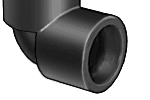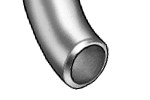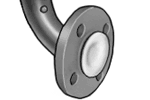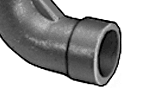|
|
|
|
|
|
| Threaded Pipe Connections |
|
Pipe threads are either tapered
or straight (parallel). The two styles are not compatible.
|
| Tapered threads
(as the name implies) have a slight taper. When mated
together and tightened, the threads compress to form a seal. The
most widely used pipe threads in North America are National Pipe
Taper threads (NPT). Some confusion may result from the use of NPT,
FPT, and MPT in describing threads. Both FPT and MPT are NPT
threads, with FPT meaning female threads (internal) and MPT meaning
male threads (external). NPTF (Dryseal) threads are modified NPT
threads which are less likely to leak without a sealant. To assure a
leak-free seal, we recommend using a sealant compound or Teflon
tape. You can use NPTF threads with NPT threads, but you'll lose
some of the leak-free characteristics.
There are a
number of threads that are compatible with NPT threads. They
are NPTF (Dryseal), NPSC (National Pipe Straight Coupling), and NPSL
(National Pipe Straight Locknut). |
|
|
Straight (parallel)
threads are used for mechanical joining. They serve one
purpose—to hold a fitting in place. As a result, an O-ring
(elastomer), hard metal seal, or soft metal seal is required.
Straight pipe threads include NPSM (National Pipe Straight
Mechanical), NPSL (National Pipe Straight Locknut), and NPSH
(National Pipe Straight Hose) threads. Unified screw threads
(UN/UNF) conform to SAE (Society of Automotive Engineers)
specifications. Sizing and pitches differ from the NPT threads. Less
common straight threads are garden hose (GHT) and fire hose coupling
(NST). |
| | |
| NPT and BSPT/BSPP Threads |
The European equivalent to NPT
tapered threads is BSPT (British Standard Pipe Taper) threads. BSPP
(British Standard Pipe Parallel) threads are straight (parallel)
threads and have the same angle, shape, and threads per inch (pitch)
as BSPT threads. BSPT and BSPP threads are not compatible with and
should not be substituted for NPT
threads.
NPT and BSPT/BSPP threads
have different angles, shape, and (in most cases) threads per inch
(pitch). The thread angle is 60° for NPT threads; 55° for BSPT/BSPP
threads. NPT threads are flattened at the peaks and valleys, while
BSPT/BSPP threads are rounded. |
| Pipe Size
|
Pipe OD |
Threads per Inch
|
|
NPT
|
BSPT/
BSPP
|
| 1/8" |
0.405"
|
27
|
28
|
| 1/4" |
0.540"
|
18
|
19
|
| 3/8" |
0.675"
|
18
|
19
|
| 1/2" |
0.840"
|
14
|
14
|
| 3/4" |
1.050"
|
14
|
14
|
| 1" |
1.315"
|
11 1/2 |
11
|
| 1 1/4" |
1.660"
|
11 1/2 |
11
|
| 1 1/2" |
1.900"
|
11 1/2 |
11
|
| 2" |
2.375"
|
11 1/2 |
11
|
| 2 1/2" |
2.875"
|
8
|
11
|
| 3" |
3.500"
|
8
|
11
|
| 3 1/2" |
4.000"
|
8
|
11
|
| 4" |
4.500"
|
8
|
11
|
| 5" |
5.563"
|
8
|
11
|
| 6" |
6.625"
|
8
|
11
|
| 8" |
8.625"
|
8
|
11 | |
|
NPT
|
|
|
|
Flattened Peaks
and Valleys
| |
|
BSPT/BSPP
|
|
|
|
Rounded Peaks and
Valleys
| | | |
|
| Unthreaded Connections |
 |
Socket-weld
fittings can help you to save the time and
effort needed to thread your pipe.Simply weld these fittings to your
system for a tight seal by applying primer and PVC cement to the outside
of the pipe end and inside of the socket. |
 |
Butt-weld
fittings
are useful when
you want even flow in sealed systems. Unlike threaded fittings, their
smooth interior improves flow as well as minimizes the need for cleaning
and servicing. To install, butt fittings up to your pipe and weld along
the point of contact. |
 |
Flanged
fittings have rotating flange connections (pipe
has fixed flange connections) for easy installation. Flange gaskets sold
separately. |
 |
Grooved
end
fittings make it quick and easy to assemble and
disassemble piping systems. Standard couplings with EPDM gaskets
provide a seal to help maintain pipe pressure ratings when joining
grooved-end pipe and fittings. Each coupling is coated with a
rust-inhibiting, water-based orange paint and includes a two-piece
housing; EPDM gaskets; and two zinc-plated nuts and bolts for securing
coupling assembly to pipe. The gasket allows the coupling assembly to
expand and contract as temperatures change, so there's no need for
expansion joints. | |



